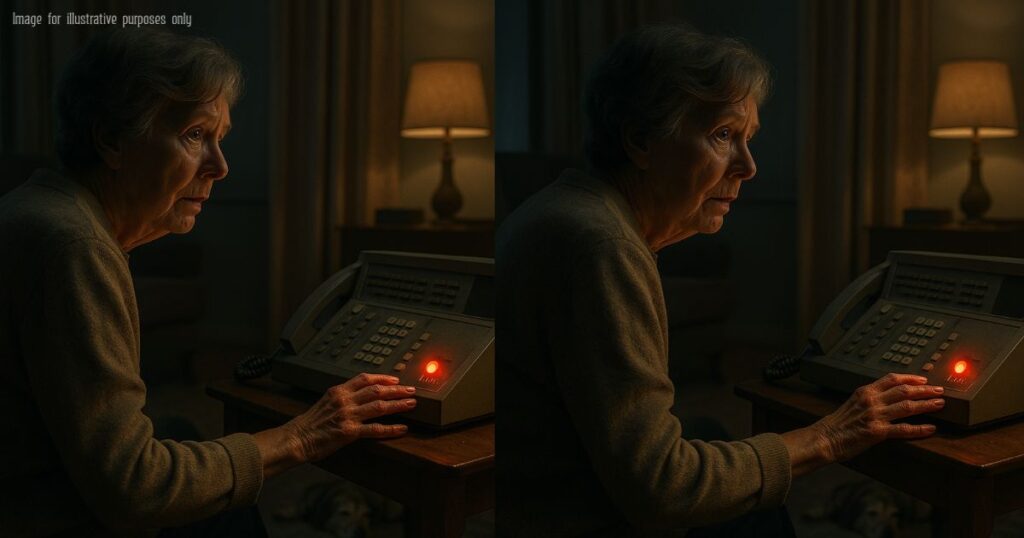Part 2 – Line 5 Still Works
Walter didn’t move from my lap for the rest of the night.
I sat there, hand still resting on the dead console, eyes fixed on nothing. The TV flickered through a few more reruns before the power-saving screen turned it black. The room dimmed, but something in me had lit up.
I couldn’t sleep.
Not from fear — not this time. Not like the old nights when the voices came back, begging to be heard. No, this was something else. Something buzzing behind my ribs. Something alive.
I stayed in the chair until sunrise, watching the light crawl across the hardwood. Walter snored, legs twitching in his dream-chase. I wondered if he remembered the station like I did — the buzz of radios, the ringing, the quiet prayers whispered into headsets. We never really leave the places that needed us most.
I used to think silence was the prize you got for surviving noise. Now I wasn’t so sure.
The next morning, I unplugged the console completely. Checked the wires again. Dead as a doornail.
It didn’t matter.
That call was real.
You don’t fake a voice like that. Not the way it cracked when he said “my sister didn’t make it.” Not the way he said thank you — like it had been sitting in his throat for years.
I made tea, sat at the kitchen table, and stared at the steam. Thought about calling someone, telling them what happened. But who? My son was in Oregon with his new family, barely called on holidays. I had a few old dispatcher friends still alive, but they’d either think I was senile or worse — jealous of a memory.
No. This was mine.
So I wrote it down.
Every word. Every pause. Like I used to do when we’d debrief after a hard shift, back before they stopped caring about mental health. It felt good to write again. To remember what it meant to feel something.
And that’s when it hit me:
He said he was a firefighter.
That weekend, I drove down to the station.
Jefferson County Station 3, the new one — all steel and glass and money. Not like the old house we used to huddle in during tornado season, drinking burnt coffee and trading worst-call stories under flickering fluorescents.
The new place had an intercom.
I buzzed in.
A young guy, maybe thirty, buzz-cut and bright-eyed, answered the door.
“Can I help you, ma’am?”
I nodded. “I was wondering if I could speak to someone about a call I got… a long time ago. It’s about one of your firefighters. He said he was saved in a Christmas Eve fire, 1994.”
He raised an eyebrow. “That’s, uh… specific.”
He called back into the station. A moment later, another man came out — tall, dark hair peppered with gray, lines on his face earned from more than smoke.
And I knew.
It was him.
He stopped short when he saw me.
“You,” he said, softly.
I nodded. “Line 5.”
We didn’t hug — it didn’t feel like that kind of moment. Instead, he gestured toward a bench by the side of the station. We sat in the sun, like old neighbors who’d never met.
“I didn’t think you’d come,” he said.
“I wasn’t sure I should.”
He smiled, but it didn’t reach his eyes.
“I’ve thought about you every year,” he said. “Every Christmas, every fire. I didn’t know your name until I saw a retirement article a few years back. One of the old medics posted it on Facebook. Said you were the best voice he ever heard.”
I laughed. “That’s what I had — a voice.”
“That’s all I had, too. In that basement.”
He told me everything.
How he and his sister had snuck the cordless phone from the kitchen. How their mother had already collapsed upstairs. How the smoke crept in like fingers, silent and deadly.
“I was nine,” he said. “But I remember your voice better than I remember hers.”
That stopped me.
I looked at him. “I didn’t know anyone survived.”
“They told me later that you stayed on the line after I passed out. For eight minutes. Firefighters said your updates helped them find me. They said most dispatchers would’ve dropped the call and moved on.”
“I couldn’t.”
He nodded. “I know.”


